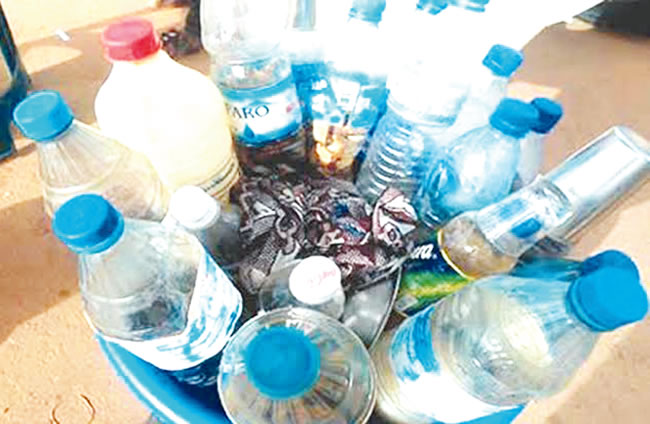FUNMILAYO AREMU reports that many people on the street love herbal drinks to a fault, despite the attendant health implications, even as medical personnel warn that those who patronise the drinks should watch out or even avoid them altogether.
In a country like Nigeria where the majority of the population lives below poverty line, access to good medical care is very low. Thus the love for alternative medicine is so high, basically not only because the ingredients are natural but also because they are relatively cheaper than orthodox medicine and more affordable. According to the World Health Organisation, between 70 and 80 per cent of Africans depend either totally or partially on traditional or alternative medicine.
Furthermore, herbal medicine promises cure for a wide range of diseases and is perceived as efficacious by those who patronise it for illnesses such as pile stomach pain, malaria, lower back pain, menstrual pain, diabetes, hypertension, gonorrhea, toilet infections and pile, among several others. However, it appears that what interests many men the most is the herbal medicines that claim to cure erectile dysfunction, boost low sperm count and men’s sexual performance, among others. To make the herbal drinks attractive they are often packaged in plastic bottles and given some suggestive names.
Investigations by Sunday Tribune reveal that these branded herbal drinks are made with honey, plain water, treated water, alcohol, ethanol and other ingredients with botanical names such as terminalia laxiflora, zingiber officinate, roots and leaves of aloe vera, ivorensis, rhubarb root, caramel syrup and other herbs.
Further investigations show that some of these branded herbal mixtures have the National Agency for Food and Drug Administration and Control (NAFDAC) numbers on them. However, a search on the website of the drug agency showed that many of the herbal products were not listed on its database. The NAFDAC registration numbers printed on those products were also discovered to be fake.
Sunday Tribune investigations reveal that many people consume herbal drinks on a daily basis across the country not caring about the production process, but only their perceived efficacy. It was also discovered that more men consume herbal drinks than women.
A group of consumers, it was revealed, use the herbal drinks basically for detoxification and nothing else. One of those who belong to this group is Jamiu Olatoke, an okada rider. According to him, “I am aware that other people use it for different purposes, but I only use it for pile, (jedi jedi).
Perry During, an Abuja-based freelance journalist, also said he sometimes uses the herbal medicines to detoxify his body, but his experience is that not all of them are good for consumption. On a certain occasion, he had stomach upset after consuming one of the drinks.
“The reason I use these bitters is to detox when I have consumed a lot of sugary stuff. And it works because I usually know I have too much sugar in my system when my butt hole starts to itch. It clears immediately after taking one of the herbal drinks.
“I remember taking one of those (herbal drinks) in Lagos once and I had a bad tummy ache which made me doubt if the industry is properly regulated. There are so many of them and you can suspect from the poor packaging,” he stated.
According to Adenike Adeleke, a hairdresser, she uses the drink for pile and stomach pain which helps her to pass stool easily and which in turn makes her feel light. She said: “I use these drinks for pile and stomach pain. Sometimes it helps me pass stool easily. I even learnt that some women who enter into menopause early can use it and their flow will come back. It is very efficient. Works like magic.”
Ayedun Oluwaseyi, a businessman and Mr Dele Odunayo, a Human Resources personnel spoke glowingly about the herbal medicine’s efficacy in boosting their sexual performance. Oluwaseyi said he takes herbal drinks “to boost my energy when performing in the other room; the women I have been with can all testify to its efficacy. It is that good.” Ayedun on his own part said: “I use one particular one; it is a very effective aphrodisiac, whenever I use it; I can go three to four rounds on my woman and I won’t get tired at all.”
While herbal drinks has its faithful consumers, others avoid it like a plague. One of such people is Reuben Okunlade, a teacher who told Sunday Tribune that he doesn’t believe in what people say about the efficacy of herbal medicine as it could have side effects that even the manufacturers are unaware of.
He said: “I don’t believe in those drinks. Many people just use it without even thinking of how they are made or where they are made. I am very careful about what I put in my mouth. I don’t just take anything. I am not discrediting those that drink it or its producers, but it is not just my thing. I value my health too much.”
Tunde Akinlade, a student also avoid the herbal drinks preferring to make his own drinks if the need arises. According to him, “Whenever I am ill, I make my concoctions myself. I go to the market, buy the ingredients and put them together because I don’t trust the people who make these agbo (herbal concoctions). I don’t know what kind of water they used; I don’t know if they washed their herbs well…So, I make my own herbal drinks for personal consumption.”
Sunday Tribune spoke to the producers of some of the branded herbal mixtures, including the locally made ones. One of the companies who produce herbal mixtures reveals that their products are made by traditional medicine experts. They claim that the ingredients used in the making of the products are not harmful to the body and have no side effects, as the concoctions are made with natural herbs and have been approved by NAFDAC.
A herbal concoction seller who gave her name as Mama Tobi told Sunday Tribune that she produces the product herself. She said: “I inherited the knowledge of traditional medicine from my grandmother who was a popular agbo seller. My products never fail; I take great care in producing them and it is very effective as I even get referrals from my usual customers.
“I use natural herbs and clean them very well before producing my drinks. I have herbs for every ailment: pile, hypertension, stroke, diabetes, low sperm count, malaria, typhoid, miscarriage and impotence, among others.”
Experts speak
The Chief Consultant, Orthopaedic and Trauma Surgeon, Federal Medical Centre, Jabi, Abuja, Dr Ganiyu Aremu, spoke with Sunday Tribune on the benefits and disadvantages of herbal concoctions including potential injuries to personal health.
“They are all slow poisons; some are even rapid poisons,” he said, adding that: “many are made of high concentration of alcohol with some herbs which content the people who put them together don’t know. They are quick to point out that all herbs are medicinal. While this may be true to some extent, they don’t know the active ingredient in what they are giving people to drink.
“Herbs contain many molecules; some are beneficial while some are harmful. Many are terrible alkaloids that can damage the kidneys, the liver and other organs of the body. But the promoters of these things don’t have the capacity to know which ones are beneficial and which ones are harmful. Even the beneficial molecules in these herbs have the limit beyond which their effects become harmful.
“The high rate of kidney and liver diseases are traceable to some of these products. Some of them also contain high concentrations of alcohol with all its attendant effects; on the liver, liver disease; on the brain, brain damage.
“I would recommend that all herbal products should be subjected to analysis to determine the efficacy and the safety of these products; both short and long-term adverse effects. The ones that are proven to be of benefit should also be made to undergo controlled clinical trials to scientifically ascertain the efficacy and the safety.”
Dapo Egunjobi, a medical doctor at the Federal Medical Centre (FMC), Abeokuta, Ogun State, also raised some questions as regards the potency and validity of claims made on such herbal products.
“There are questions we need to ask as well. Medicine is based on science and ultimately research. Studies are done over time to check the efficacy of medications and treatment of diseases. Many things are put into consideration including the source of such medications or drugs, clinical trials done on them and research.
“Have the herbs been tested scientifically? How many people have used such herbs, including the results seen? What are the potential side effects? What quantity was used? How was it measured? What is the dosage, based on age or sex? What temperature is effective for the storage of those herbs? The people who used it: what was it used to treat? Were they monitored for side effects or complications?
“Herbs in its natural self is not harmful. Many drugs are made from herbs. However, some are mixed with other dangerous chemicals which can damage the kidneys, liver and heart. The possibility of their effectiveness can only be proven scientifically in the laboratory when they are subjected to some standards,” Dr Egunjobi explained.
Doctor Temitope Adedayo of the University College Hospital (UCH), Ibadan, submitted that herbal drinks can be harmful to the health when they are not standardised and when they are not scientifically proven to be safe and healthy for consumption.
“Herbal drinks can be harmful to health and the reason is that they are usually not standardised in their preparation and the usage is usually not well-titrated also. Plus, they usually contain impurities. I can›t say specifically for certain products. I do not know if they cure the diseases listed on them. I have no study on them. I, however, know that herbal concoctions can be effective against diseases. They, most times, just need to be more researched into and the preparation better fine-tuned.
“In a situation where an individual consumes these herbal concoction in large portion, there are chances that the kidney and the liver would be damaged as they are usually the organs that suffer the most when they are loaded with too much herbal concoction,” he said.
In a recent report, the Director-General of NAFDAC, Professor Mojisola Adeyeye, said most herbal concoctions that are being hawked on the streets and in buses lack proper storage and should be avoided because of the uncertainty of its source.
According to her, the liquid herbal concoction grows bacteria after four or five days, which is dangerous to the health of its consumers. She, however, noted that consumers should ensure that the product they consume must have passed NAFDAC’s safety and efficacy test.
Despite these observations and warnings however, it is not likely that ardent lovers of herbal drinks may take caution or even abandon their favourite herbal drinks altogether. The reality, as discovered by Sunday Tribune is that the patrons are hooked on the herbal drinks and even go around with them.








